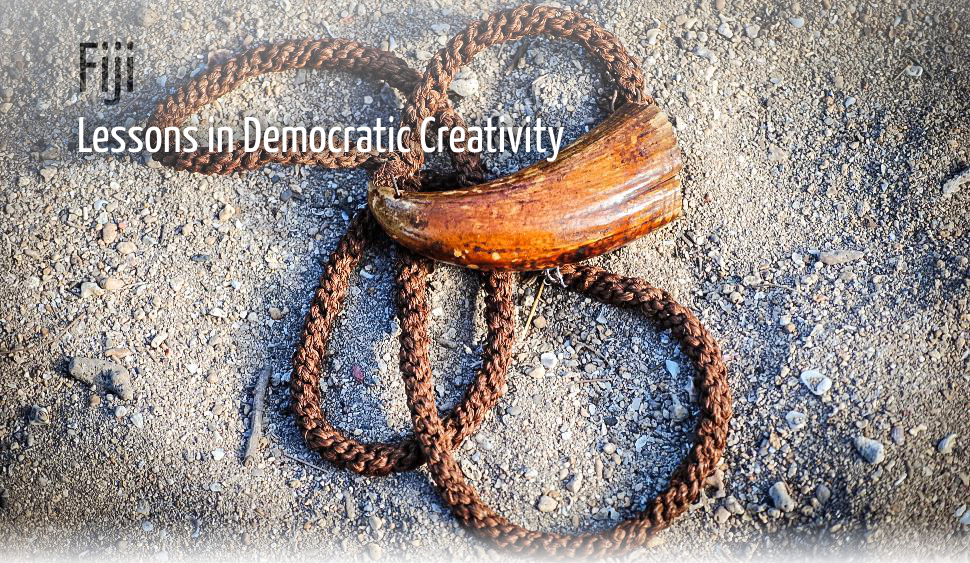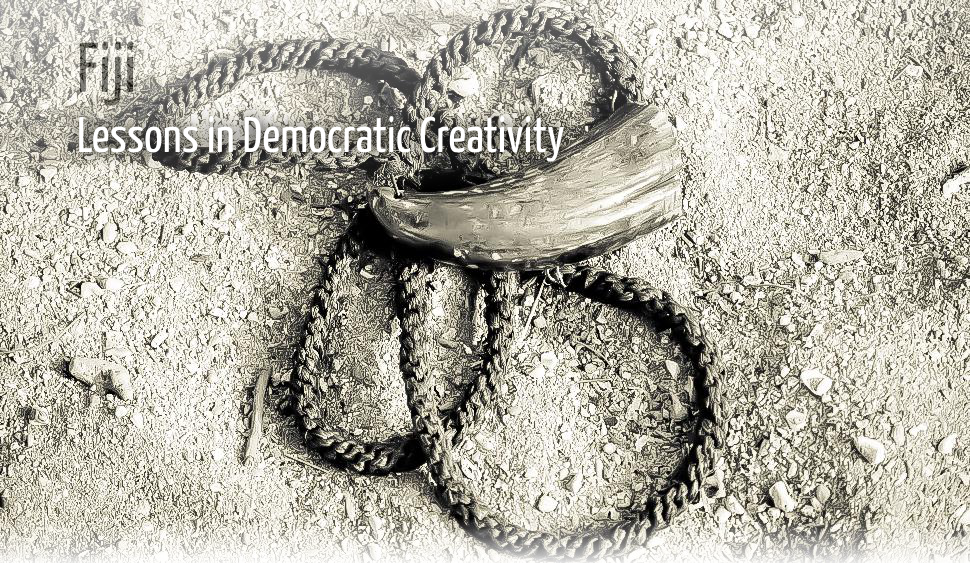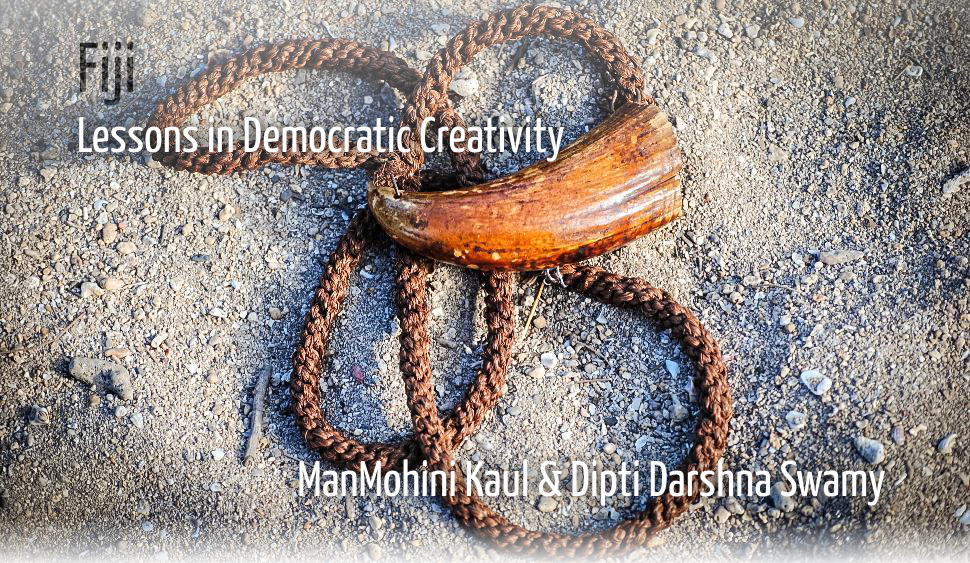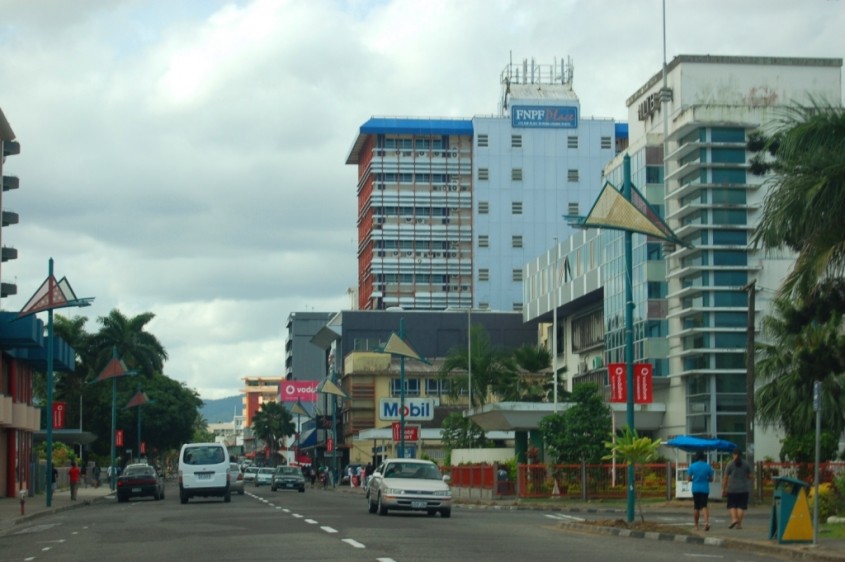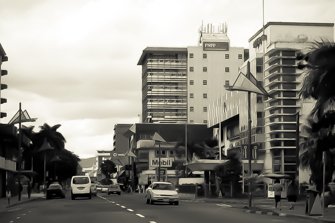|
17 October 2014
Time, once again. But time, this time, with a big H. How often do we actually witness the writing of History? And how often, instead, are our politicians mixing the everyday political with the real visionary breakthroughs? While certain agencies down here overcharge their desire for change unimaginatively, forcefully trying to steal the past, out there, unpretentious nations sit down to prepare the future. After eight years of military rule, Fiji elected its parliament through a remarked democratic transition. Political creativity was put to use to transcend, among other challenges, a century of escalation on the ethnic edge. Thus was reclaimed the Tabua, the traditional whale’s tooth, symbol of peace between parties and communities. Quite a lesson to notice, at a time when the supposed major multicultural societies of our world are still halting on their way to History, burdened that they are with the trite tragedies of communal agendas. This week on LILA Inter-actions, ManMohini Kaul deciphers the recent developments in Fiji and explains why this may truly be a major time for the country, but also for international partners like India. Young Fijian in India, Dipti Darshna Swamy, reflects on her lived experiences across the two countries and expresses her aspirations for the future of the new democratic Fiji.
Debate
Hold the cursor on the illustrations to display animations.
|
|

In the recent elections held after eight years on 17 September 2014, Frank Bainimarama’s Fiji First party won 32 out of 50 parliamentary seats. As a result of this victory, Bainimarama is now the elected Prime Minister of Fiji and it needs to be pointed here that a large majority of Indo-Fijians voted for his party, thus expressing their faith in his commitment to end the ethnic politics of Fiji, based on discriminatory laws enshrined in the earlier constitutions of 1970, 1990 and 1997. To many of his critics, his victory does not bode well for a genuine transition towards democracy, as his record is blemished with the coup of 2006, which was carried out to overthrow the elected government of Laisenia Qarase. Despite apprehensions regarding the future role of the army, the elections were welcomed by all the major stakeholders, and especially the regional powers – Australia and New Zealand, for whom Fiji and other South Pacific island states are of great geo-strategic importance, as they are located in their immediate neighbourhood.
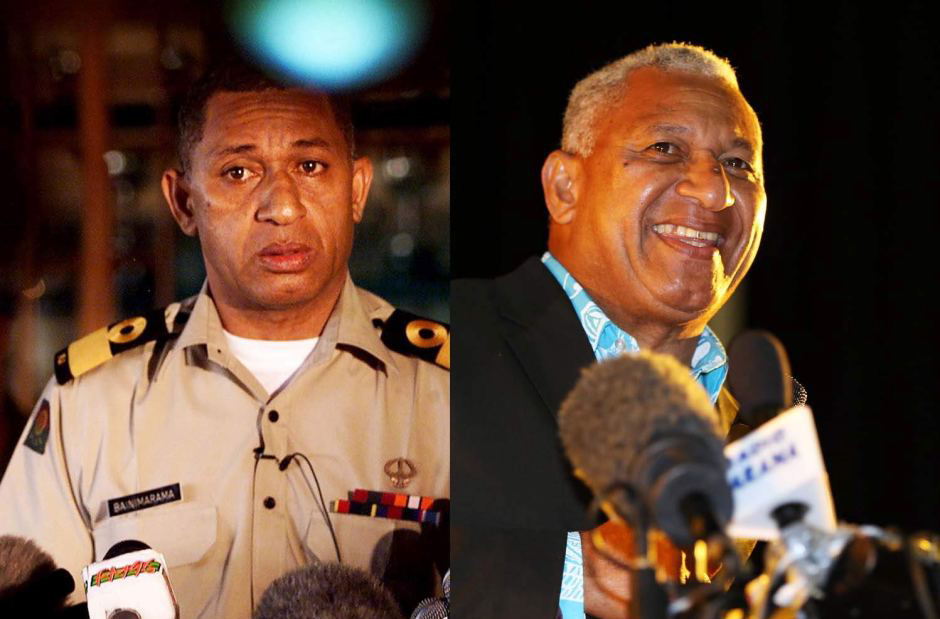 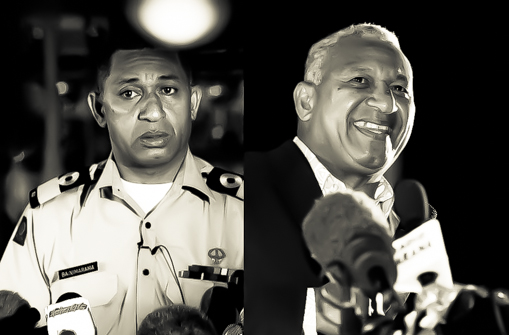
Frank Bainimarama:
from Commander of the Fijian Military Forces
to elected Prime Minister
Under the new constitution, which was ratified in 2013, there are reasons to believe that democratic Fiji will hopefully emerge as a truly multicultural state. Some of the major changes introduced in the new constitution will definitely impact the political narrative of Fiji in the future. Five of these are enumerated here:
- Fiji has been declared a secular country, which is a courageous and incredible departure from the previous dynamics of politics, which had been dominated by racial divide;
- The political system is now based on a common electoral role, with the principle of ‘one man, one vote’, instead of the communal electoral system that had been in place since Fiji’s independence;
- All the citizens of Fiji under the new constitution will be known as Fijians – earlier this nomenclature only referred to indigenous Fijians;
- No longer are parliamentary seats reserved on the basis of ethnicity, a practice which even the much-heralded 1997 constitution could not do away with;
- The regressive Great Council of Chiefs finds no place in the new constitution.
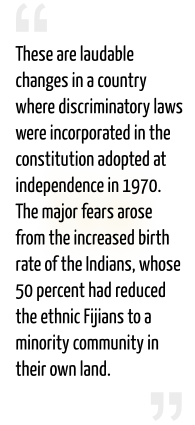
These are laudable changes in a country where discriminatory laws were incorporated in the constitution adopted at independence in 1970. The major fears arose from the increased birth rate of the Indians, whose 50 percent had reduced the ethnic Fijians to a minority community in their own land. This fear, almost fringing on paranoia, resulted in the incorporation of certain clauses regarding the inalienable rights of Fijians towards their land, customs and way of life, and these could not be changed without the consent of the Council of Chiefs in the Senate.
In Fiji, the Indians were brought by the British in 1879 as indentured labourers to work on the plantations. Under the colonial rule, separate local administrations were evolved for the Indo-Fijians and for the Fijians. This ‘divide and rule’ policy of the British laid the foundation for the separation between the two communities. When indentured labour was abolished in 1920, the majority of Indians chose Fiji as their new home, even though it meant living under insecure conditions. The political system worked out by the British was discriminatory and set the institutionalised supremacy of indigenous rights, which impacted the relations between the two communities, leading to a struggle for power sharing. This has been a narrative of a post-colonial society deeply divided between the two ethnic groups, attempting to make the transition from tradition to modernity. Of the total population of 800,000 in Fiji, Indians now form 41 percent. Their number has declined due to migration to other countries, especially since the coups of 1987. However, for the majority of Indo-Fijians, Fiji continues to be the cherished homeland.
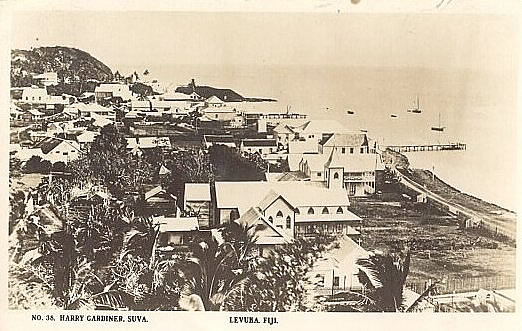 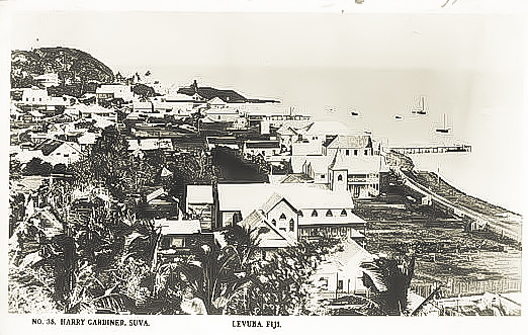
A post-card from the early days
of the British presence in Fiji

In the field of Foreign Policy, major transformation has been underway in Fiji in the eight years of Bainimarama’s military rule. During his regime, the focal point of his foreign policy shifted from the West to Asia, through the active pursuit of the ‘Look North policy’. This happened particularly after the tense standoff with Australia and New Zealand, due to the wide range of sanctions imposed by them in order to exert pressure on Bainimarama to hold elections. Unlike the antipodean countries, the major Asian countries like India, China, Indonesia, Malaysia, Taiwan and South Korea responded to the friendly overtures made by Bainimarama. Bilateral relations expanded significantly with all the above mentioned countries. Confident Fiji began to punch above its weight in the field of international relations and within the sub regional grouping of the Melanesian Spearhead Group (MSG). During the years of estrangement with long-established partners like Australia and New Zealand, China emerged as a major beneficiary with growing influence in Fiji, and through its cheque book diplomacy has gained much goodwill.
India-Fiji bilateral relations have gone through a significant transformation during the past eight years. The uneasy relationship that India had with Fiji prior to 2006 was replaced by a new understanding and warmth during Bainimarama’s military rule. It was correctly perceived by the Indian policy makers that unlike the regimes that followed the coups of 1987 and 2000, Bainimarama’s military rule was not racist in its approach towards Indo-Fijians. India is cooperating in the sustainable development of the region, and Fiji, like most South Pacific island states, needs Indian assistance for capacity building. India is assisting Fiji in various sectors, like IT, health, agriculture, forestry, tourism, education, rural development, cottage and small scale industries, and even in the training of the peacekeeping force.
There is no doubt that with the transition to democracy, Fiji will continue to pursue bilateral engagement with the Asian countries, and at home it will negotiate political accommodation to ensure ethnic reconciliation. The 2013 constitution has not belied the expectations of those like India, who hope to see Fiji emerge a truly multicultural country, where the politics of race would no longer be the central determinant of the political discourse.
|

Fiji has been and is a multicultural society. In my experience, I have seen Indians, Fijians, all races and creeds, living together, peacefully. Everyone follows his or her own traditions, customs and rituals without intereferences from the others. My own family is an example of this mixed culture: our cultural roots are in Christianity, Islam and Hinduisum, so we follow them all. We have no restriction about following just one tradition and not the others. In fact, it is as if Fiji was one big family, and this family celebrates the festivals of all its members. Because of this, one cannot say that one ritual is more important than another in Fiji. The natives – the community originating from the island, tracing back here before the entry of the British and of the Indian workers – have different rituals from ours. But we respect and still celebrate them. It is habitual that families travel across the islands to visit all the spiritual places – temples, mosques, gurudwaras, churches, etc.
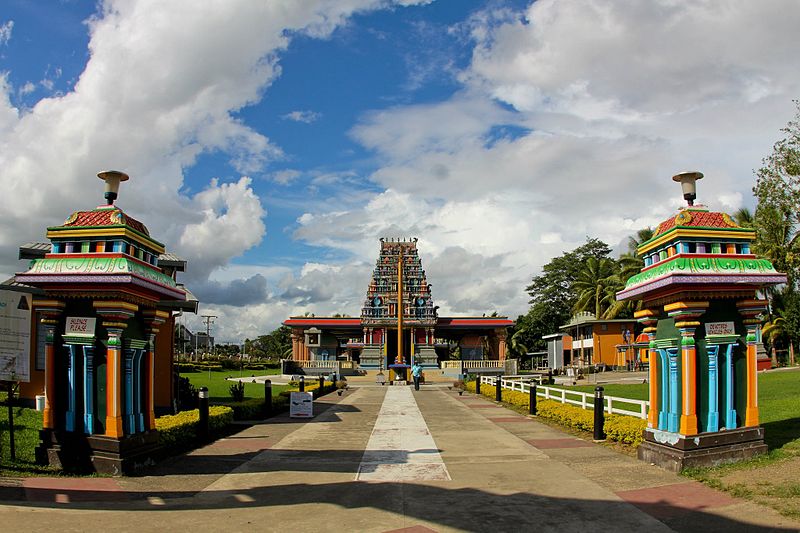 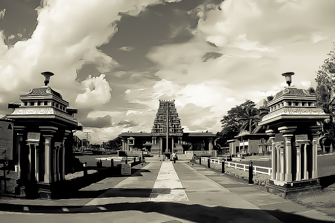
The Sri Siva Subramaniya Temple,
famous Hindu temple of Fiji
Somehow, I have not tried to ask my ancestors where our family tree came from exactly. It did not come up; perhaps when cultures get mixed these questions do not seem so important anymore. But I know that they came from India. They were labourers, brought by the British, to work in Fiji. They most probably faced difficulties in adapting to the environment and the culture, but decade after decade, Fiji truly became our own country, our culture.
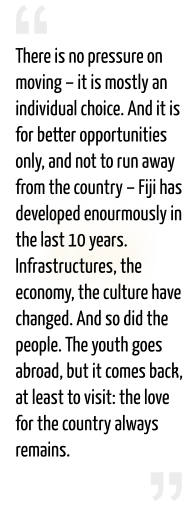
Today, Fiji is a modernised country. I have a sense that the youth is generally aware and grateful for this democratic society in which we are living quite peacefully. The youth is given all the rights and power to speak, and the country is moving accordingly. But we are also quite open to other countries, and a number of people migrate abroad. Australia, New Zealand, Canada or the USA are the privileged destinations, mostly for jobs and education. At times, it may also happen for marriages, or to enjoy even more comfortable life conditions. But there is no pressure on moving – it is mostly an individual choice. And it is for better opportunities only, and not to run away from the country – Fiji has developed enourmously in the last 10 years. Infrastructures, the economy, the culture have changed. And so did the people. The youth goes abroad, but it comes back, at least to visit: the love for the country always remains.
There is a feeling of belongingness in Fiji, and I believe that we, Fijians, are quite proud about our country. Truly, it is far from many other powerful countries of our world, and not as well off as some of them. I do not think it is an issue if some countries, for instance in Asia, do not know much about Fiji, because a lot of people do in other countries – for instance in Australia, New Zealand, Canada, the USA, China, Japan, or Indonesia. It is not necessary, from my point of view, that everyone knows about Fiji. Our happiness and our development do not depend on that. And, in the next five or ten years, this image will change. But today, personally, size, geopolitical power or popularity in the world do not affect my own image as a citizen of Fiji.
It was my own decision to come to India. I was curious and eager to visit this country, and my studies gave me an occasion to do it. I received a scholarship from an Indian institute. My field of study, Public Administration, is quite developed in Fiji, but it remains quite expensive there. Therefore, the scholarship came as the convincing factor to influence my decision.
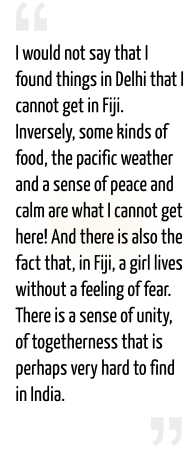
I have been in India for three years, and I found it easy and comfortable to adjust. Staying in Delhi is quite enjoyable – as the capital of India, many things happen here, and this metropolitan area is quite modernised. But I would not say that I found things in Delhi that I cannot get in Fiji. Inversely, some kinds of food, the pacific weather and a sense of peace and calm are what I cannot get here! And there is also the fact that, in Fiji, a girl lives without a feeling of fear. There is a sense of unity, of togetherness that is perhaps very hard to find in India.
According to me, India is in its developing stage. It is quite developed in some areas, but others need a lot of attention and work. I hope that the government will address all the urgent questions more effectively. The conditions of women is one of them. Clearly, women must enjoy more actual rights. Their say should be more influential in society, and we must find ways to make them feel more secure. The poverty line and problems of hunger are other urgent questions that a developed power like India should act upon immediately.
I have appreciated my stay in India, but I would still prefer to spend my life in Fiji. I plan on returning home to do further studies, and work, near my family. I could consider other opportunities to go abroad, but as of now I believe that I would prefer staying in Fiji. I wish to serve the government, since it has done a lot for us.
Fiji is now greatly modernised,
but its future reserves a few challenges
Fiji has challenges ahead of itself. They include expanding the education sector for the upcoming generations, as well as the IT industry, utilising the graduate students who did their education in Fiji and abroad. The newly elected government is setting up plans to organise this development.
I see myself as a part of this future of Fiji. I am currently doing my Bachelor of Arts in Public Administration, Tourism and Sociology. I plan on pursuing my education further through a Masters in Tourism. In this field, I can contribute to the betterment of my country – tourism is one of the main sectors of income for Fiji. There are also many jobs available in this field. This could be my contribution to the growth of my country.

|
